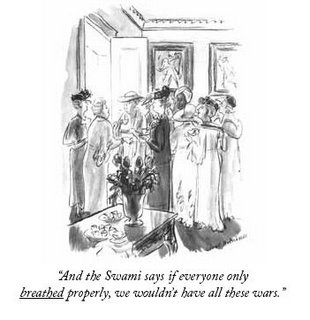Raju towards the end is forced to fast to bring rains. Food is on his mind all the time. But then..."If by avoiding food I should help the trees bloom, and the grass grow, why not do it thoroughly? For the first time in his life he was making an earnest effort, for the first time he was learning the thrill of full application, outside money and love; for the first time he was doing something in which he was not personally interested. He felt suddenly so enthusiastic that it gave him a new strength to go through the ordeal....."
And then it rains.................Next, can Raju prevent wars? Sure, if we learn to breath properly!
 Artist: Helen E Hokinson Publication : The New Yorker 25 Jul 1936
Artist: Helen E Hokinson Publication : The New Yorker 25 Jul 1936
1 comment:
haha.. awesome!
Post a Comment